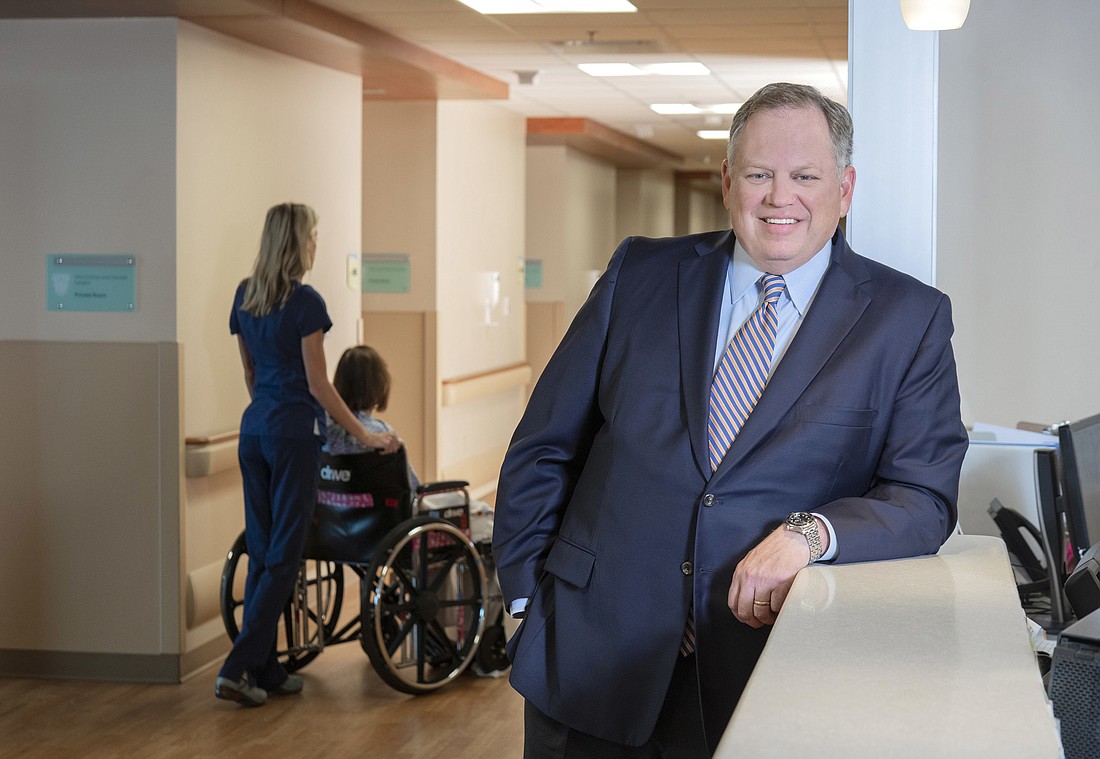- April 1, 2025
-
-
Loading

Loading

When you work in health care, you always need to be able to think on your feet. “You get presented with challenges that are somewhat unpredictable, and you have to be able to adapt and work with different problems,” says David Verinder, president and CEO of Sarasota Memorial Health Care System.
Those kinds of skills were tested more than ever before in 2020, when health care providers were faced with the pandemic. “No one here, or anywhere, had ever gone through anything like this, so we were learning and trying to adapt to what the needs of the community were,” says Verinder. “It was listening to lots of experts and our team members to make judgments as we went along.”
But throughout the challenging year, Verinder, 54, also kept Sarasota Memorial Health Care System moving forward with what the organization calls its “most significant expansion” in its 95-year history. That includes the building of a new hospital in Venice to serve the southern part of the county; the development of a comprehensive cancer institute to give oncology patients access to the latest treatments; technologies and clinical trials; and the planned construction of a state-of-the-art behavioral health pavilion at the Sarasota campus.
“We made a decision early on not to back off of our long-term strategies,” he says. “We felt, in a very real way, the need to be able to multitask and keep our long-range plans moving on, because those are the needs that are going to continue to grow for the community.”
Constantly evaluating the needs of the people you serve, and then changing and adapting where necessary to meet those needs, are vital for continued success as a health care provider. That’s the reasoning behind all the new projects underway at Sarasota Memorial.
The development of a comprehensive cancer program, for example, came about because patient behavior demonstrated a clear issue. “We saw about 50% of patients diagnosed with cancer in Sarasota choosing to leave the area [for treatment], and we thought that was unacceptable,” says Verinder. “So we started looking into how do we do cancer in a different way, and how do we make it not only so people don’t feel like they need to leave the area, but also so they would be attracted to the area to seek out care?”
Verinder says a natural curiosity and a thirst for learning are musts when leading a large organization, such as SMH, through change. “I think at the end of the day, we always have to keep asking the question ‘What more can we do for our community?’” he says.
Being open to new ideas or approaches is also key. “You need to put a lot of your biases on hold or on the side and listen to as many different people as you can,” he says.
That’s why he’s found it important to have a good team in place. “When we get faced with a challenge, be it a hurricane or some type of infrastructure problem in the hospital or the pandemic, if you’ve assembled a team around you of people that you trust, you’ll work together to come up with solutions,” he says. “Everyone brings a different aspect to the problem, and that’s where you come up with the best answers.”
While Verinder mostly looks ahead to anticipate what the community might require down the road — more change —he’s also not afraid to look back. “I think you always have to go back in and look at what made you go down a certain path,” he says. “If you make a decision and never look back, you never learn from that. And there are always alternatives for how to do something….You can never be afraid to say we maybe should have gone in a different direction. If you let your pride get in the way, I think you’ll find a less desirable outcome at the end.”